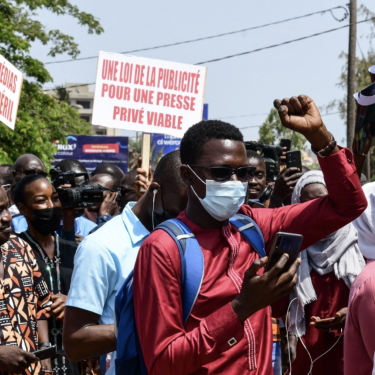Alarming increase in threats and attacks against journalists in run-up to Senegal’s elections

Reporters Without Borders (RSF) has produced recommendations for the safety of journalists in the run-up to Senegal’s parliamentary elections on 31 July, which have so far been marked by tension and an increase in threats and attacks against media personnel since late May. The election campaign begins officially on 10 July.
“What with being manhandled at press conferences, prevented from covering political rallies and threatened on social media, reporters covering and commenting on Senegal’s upcoming elections have been subjected to a disturbing escalation in verbal and physical threats since May,” said Sadibou Marong, the director of RSF’s West Africa bureau. "Journalists must not become targets because of the central position they hold in the coverage of political developments. The authorities must protect journalists during the election campaign, in particular, and must conduct investigations into all the attacks that have taken place against them before the start of the official campaign.”
In a video that has gone viral on social media, Talla Sylla, the coordinator of the Republican Youth Convergence (COJER), a ruling party youth wing in Touba, a city 190 km east of the capital, Dakar, is seen calling for an arson attack against the privately-owned TV channel Wal Fadjri. The journalists’ union reacted by calling on the TV channel’s management to file a complaint against Sylla. Moustapha Diop, the news director of the media group that owns the TV channel, confirmed to RSF that a legal summons has been issued requiring Sylla to confirm or deny what he says in the video.
The threat against Wal Fadjri is far from being isolated in a country where some politicians are in the habit of directly targeting journalists. The run-up to the start of the official election campaign has been particularly difficult for journalists and media outlets, with at least two other incidents involving journalists covering political rallies between late May and late June.
A team of reporters for Groupe Futurs Médias (GFM), a privately-owned TV channel, was prevented from covering the preparations for an opposition party rally by some of the party’s members on 8 June in Dakar. In late May, a woman journalist with the Dakar Buzz news website was manhandled simply for asking a question during a meeting of ruling coalition parties.
After both of these incidents, the main political representatives concerned apologised to the media and to their union. RSF regards these public apologies as a first step, but reminds the authorities that they must guarantee the safety of journalists, especially during a particularly sensitive electoral period that can give rise to tension and excesses. Conducting appropriate investigations into attacks against journalists is the best way to avoid any escalation to more serious cases of violence.
Increase in attacks
Senegal has seen a significant increase in verbal and physical attacks against journalists since February and March 2021. News media revelations that a massage salon employee had filed a rape complaint against opposition leader Ousmane Sonko were followed by several attacks against the premises of radio and TV stations.
Wal Fadjri crime reporter Pape Ndiaye received many death threats in the form of audio messages on WhatsApp, video messages and phone calls in the first few months of 2022. On some occasions, journalists have also been targeted in the course of their work by the security forces.
In response to the difficult political situation, an alliance of journalists’ associations called the Press Actors Coordination (CAP) appealed for a national dialogue last week. Ibrahima Lissa Faye, a CAP member who heads the Online Press Professionals Association (APPEL), told RSF: “The Senegalese media (...) want to continue to be free and independent in the service of the citizen, despite the intimidation and attacks from all sides, from both government and opposition parties and politicians.”
Several resources have been made available to journalists with the aim of helping them to cover the elections professionally and safely. They include a reporter’s manual published by Senegal’s National Council for Broadcasting Regulation and a new French-language edition of the Handbook for Journalists during Elections, which was issued at the start of 2022 by RSF and the International Organisation of the Francophonie (OIF).
RSF’s recommendations
RSF reminds media and journalists that their safety is important in the course of their work.
1. RSF urges media outlets to ask each political party and candidate, and the government, to issue a declaration of respect for – and promotion of – the physical and online safety of journalists as the election campaign gets under way.
2. In the event of any attack, whatever its nature or form, journalists must report it to their news organisation, the authorities and unions, and must demand that immediate measures are taken to protect them and punish those responsible for the violence.
3. Journalists must be aware that social media can be used against them as tools for harassment and disinformation.
4. They must bear in mind that they have the right to refuse to do reporting that entails risks to their safety.
5. They can wear a vest labelled “press” when that improves their protection without increasing their vulnerability.
